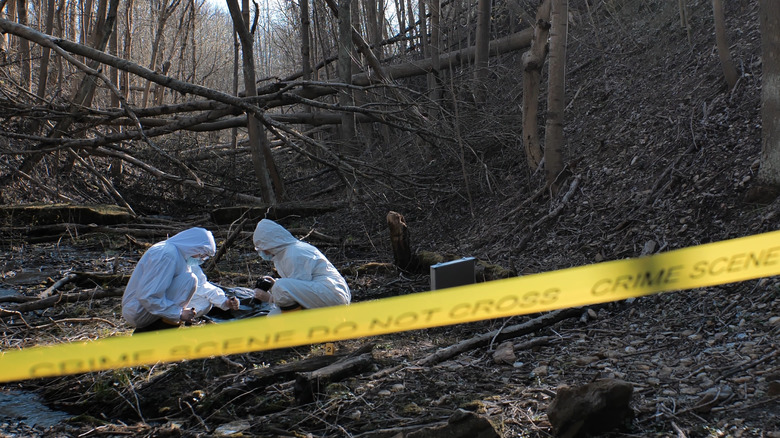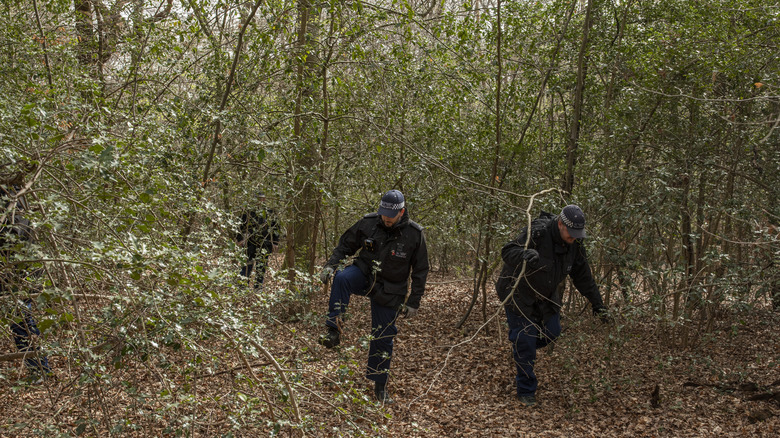The Drought That Solved A 40-Year-Old Cold Case
It was an average night in May, 1971 when Cheryl Miller and Pamella Jackson went missing in Vermillion, South Dakota, according to the Sioux City Journal. The 17-year-old girls had gone to visit Miller's grandmother in the hospital earlier in the day on May 19. Then, later that evening, they met up with friends, with whom they meant to attend a party (via Only in Your State). They agreed they would follow their friends' car to get to the party. But somewhere on the road, something went wrong; the girls' friends missed a turn, and when they looked again in their rearview mirror, they didn't see Miller and Jackson's Studebaker car. The girls didn't show up at the party, either. In fact, they were never seen alive again.
Over the following decades, many investigations and search-and-rescue efforts would be undertaken to try to locate the girls. But it wasn't until 2014 that a drought would finally reveal the answer to this decades-long mystery.
Who were Cheryl Miller and Pamella Jackson?
Cheryl Miller and Pamella Jackson were students at Vermillion High School in Vermillion, South Dakota at the time of their disappearance in 1971 (via It's Crime O'Clock Somewhere). A farmgirl, Jackson lived around 15 miles outside of town. While Jackson was close to her parents, Miller had a more contentious relationship with her mother, who struggled with alcoholism. As a result, Miller spent much of her life living with her grandparents.
At the time of Miller and Jackson's disappearance, Miller's grandmother was in the hospital, according to the Sioux City Journal. Having visited her grandmother earlier in the day, Miller and Jackson decided to go to a party the night of May 19, which was being hosted by the senior class near the gravel pits in town. Rather than trying to obtain permission from their parents to go to the party, they lied and said they were going roller skating. But the truth came out when Jackson's mother discovered, early the morning of May 20, that Jackson had not returned home the night before.
The initial investigation into the disappearance
By 7 a.m. the morning after the girls' disappearance, both their families had grown worried, according to It's Crime O'Clock Somewhere. An investigation was launched by the police on May 21, a day after the girls went missing. Initially concerned there might have been a car accident, searchers combed the side of the road and the Missouri River for any sign of the girls. They came up empty-handed. Other theories about the disappearance were brought into consideration, including the possibility that the girls might have run away or gone to visit relatives. But this theory didn't make sense to either their families or investigators, as the girls had given no indication they hadn't planned to return that night.
Over time, as increased inquiries continued to turn up little to no information, the case eventually went cold. It wasn't until 2004 that renewed interest in the case was incited when a new South Dakota cold case unit was created, which took on Miller and Jackson's disappearance as one of their first investigations (via CBS News).
A near-arrest in 2004
In September of 2004, the cold case investigation appeared to uncover pertinent information to the girls' disappearance. Investigators got a tip from a family member of Jackson's saying Jackson had made a phone call the prior month to a man named David, in which Jackson appeared to talk about drinking, according to the Argus Leader. Investigators thought the call could have been to one David Lykken, who in 1971 lived near the gravel pits where the girls went missing. As of 2004, Lykken was serving an unrelated kidnapping and murder charge with a 225-year sentence.
In pursuit of the lead, investigators searched a local farm where Lykken had lived in 1971. There, they uncovered clothes, a purse, and even bones, according to CBS News. Further conversation with family members of the girls uncovered that Lykken knew both Miller and Jackson through church. Then one of Lykken's cellmates told investigators that Lykken confessed to the murders. Subsequently, Lykken was indited on murder charges, according to NPR. However, the cellmate later recanted his statement, and thereafter, in the face of circumstantial evidence, the case against Lykken was dropped.
New information uncovered
The case got its next — and final — break in 2013. After a long and protracted drought, a riverbed dried up enough to reveal the wheels of a 1960 Studebaker car, according to the BBC. Before its discovery, the car had been underwater for more than 40 years. Investigators confirmed that the car belonged to Miller's grandfather, and that it contained the remains of both Cheryl Miller and Pamela Jackson (via The Guardian). The girls were identified through DNA as well as via the personal items which were found in the vehicle, including Miller's purse, which contained her license as well as photos and notes, according to the Argus Leader.
Investigators looked for hints of mechanical malfunction or proof that the girls had been drinking, but most evidence seemed to point to an accident, according to NPR. The keys were in the ignition of the car when it was found, and though the car did have a damaged tire, it was unclear whether this caused the accident, or if the damage was incurred during the crash (via The Sioux City Journal).
Response from family and friends
The discovery came as a big relief for the families of Miller and Jackson, who had spent so many decades wondering what had happened to the girls. In a statement about the discovery, the families of Miller and Jackson said, "Our day has come. Through this journey for answers pertaining to our beloved sister Sherry and dear friend Pam. We will now be able to finish the last chapter of this journey. With the help of all of our police forces, our family and friends, our family cannot thank you enough for the continued support you have given to us. We are now able to carry out our mother's last wish" (via The Argus Leader).
Tragically, Oscar Jackson, Pam's father, never learned what happened to his daughter: Oscar, who relentlessly searched for his daughter, died five days before the car was found, at the age of 102 (via Only in Your State).





